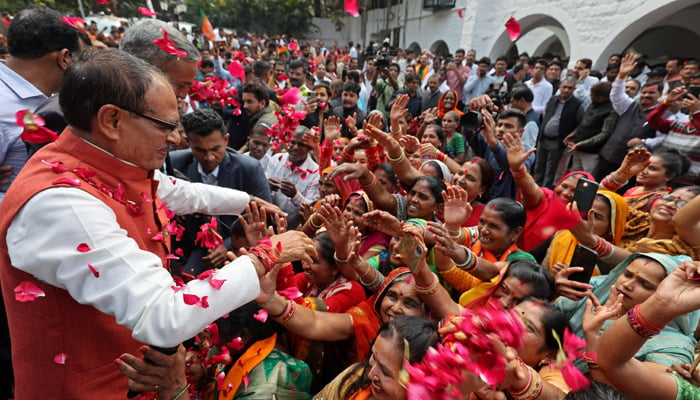Experts raise concerns over upcoming Indian polls as BJP eyes third term
Islamabad : While several South Asian countries are holding elections, the results of the upcoming Indian elections will significantly impact the country within and beyond its national borders. Concerns arise as the BJP eyes a third term, with potential repercussions including further escalation in Hindu fundamentalism and compromises on the rule of law. Besides, the results will also wield a substantial influence on regional dynamics and redefine India’s interactions with its neighbours.
This was observed during a roundtable, “Democracy in India: New Dynamics & Evolving Scenario,” held at the Institute of Policy Studies (IPS), Islamabad. This roundtable was the first of a series of discussions being held to understand the decade of Bharatiya Janata Party’s (BJP) rule, marked by enormous changes in socio-political outlook and policy shifts, and navigate the future course to which India is heading in the backdrop of the general elections scheduled for May.
The roundtable, chaired by Khalid Rahman, chairman, IPS, was addressed by Dr Mujeeb Afzal, author, associate professor, School of Politics and International Relations (SPIR), QAU, Dr Farooq Adil, author and journalist, Iftikhar Gilani, journalist, Ambassador (r) Syed Abrar Hussain, vice chairman, IPS, Prof Dr Fakhr-ul-Islam, advisor research and academic outreach, IPS, legal experts, scholars, and journalists.
The speakers said the biased constitutional interpretations in India signal its shift from a secular state to a Hindu-centric one. This has undermined the rule of law, influenced by Hindu nationalism, leading to an autocratic bureaucratic structure with Hindu extremists capitalizing on divisive issues.
Dr Mujeeb Afzal said the Indian constitution, initially contextualized for the diversity within the nation, has transformed into a compromised rule of law. This is due to the influence of Hindu nationalism in shaping the constitutional discourse and its interpretation of the constitution, signalling potential challenges to its secular fabric.
-
 Bad Bunny Stunned Jennifer Grey So Much She Named Dog After Him
Bad Bunny Stunned Jennifer Grey So Much She Named Dog After Him -
 Kim Kardashian's Plans With Lewis Hamilton After Super Bowl Meet-up
Kim Kardashian's Plans With Lewis Hamilton After Super Bowl Meet-up -
 Prince William Traumatised By ‘bizarre Image’ Uncle Andrew Has Brought For Royals
Prince William Traumatised By ‘bizarre Image’ Uncle Andrew Has Brought For Royals -
 David Thewlis Gets Candid About Remus Lupin Fans In 'Harry Potter'
David Thewlis Gets Candid About Remus Lupin Fans In 'Harry Potter' -
 Cardi B And Stefon Diggs Spark Breakup Rumours After Super Bowl LX
Cardi B And Stefon Diggs Spark Breakup Rumours After Super Bowl LX -
 Alix Earle And Tom Brady’s Relationship Status Revealed After Cosy Super Bowl 2026 Outing
Alix Earle And Tom Brady’s Relationship Status Revealed After Cosy Super Bowl 2026 Outing -
 Why King Charles Has ‘no Choice’ Over Andrew Problem
Why King Charles Has ‘no Choice’ Over Andrew Problem -
 Shamed Andrew Wants ‘grand Coffin’ Despite Tainting Nation
Shamed Andrew Wants ‘grand Coffin’ Despite Tainting Nation -
 Keke Palmer Reveals How Motherhood Prepared Her For 'The Burbs' Role
Keke Palmer Reveals How Motherhood Prepared Her For 'The Burbs' Role -
 King Charles Charms Crowds During Lancashire Tour
King Charles Charms Crowds During Lancashire Tour -
 ‘Disgraced’ Andrew Still Has Power To Shake King Charles’ Reign: Expert
‘Disgraced’ Andrew Still Has Power To Shake King Charles’ Reign: Expert -
 Why Prince William Ground Breaking Saudi Tour Is Important
Why Prince William Ground Breaking Saudi Tour Is Important -
 AOC Blasts Jake Paul Over Bad Bunny Slight: 'He Makes You Look Small'
AOC Blasts Jake Paul Over Bad Bunny Slight: 'He Makes You Look Small' -
 At Least 53 Dead After Migrant Boat Capsizes Off Libya
At Least 53 Dead After Migrant Boat Capsizes Off Libya -
 'God Of War' Announces Casting Major Key Role In Prime Video Show
'God Of War' Announces Casting Major Key Role In Prime Video Show -
 Real Reason Prince William, Kate Broke Silence On Andrew Scandal Revealed
Real Reason Prince William, Kate Broke Silence On Andrew Scandal Revealed




